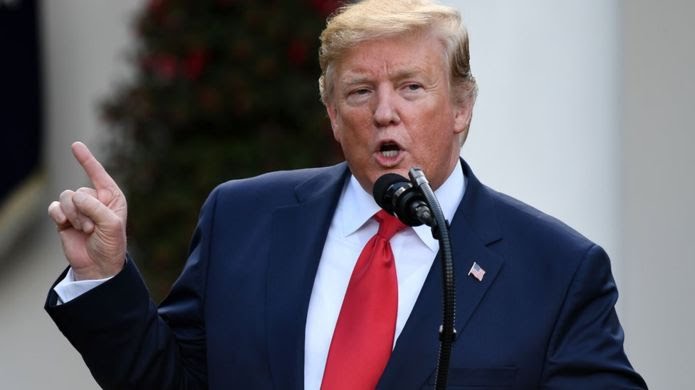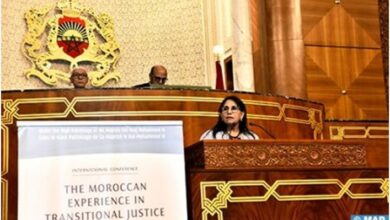Trade war: Trump says China ‘broke the deal’ in talks

President Donald Trump speaks during an event to present US golfer Tiger Woods with the Presidential Medal of Freedom in the Rose Garden of the White House in Washington, DC, on May 6, 2019.
US President Donald Trump has said China “broke the deal” in trade talks, ramping up hostilities ahead of negotiations between the two sides.
The comments came as Beijing said it would retaliate with “necessary countermeasures” if the US raises tariffs on Chinese products.
Mr Trump has vowed to more than double tariffs on $200bn (£152bn) of Chinese goods on Friday.
Despite that, the two sides are due to hold trade talks in the US on Thursday.
How the trade war has played out
The Chinese delegation for the Washington talks is led by Vice Premier Liu He, one of the most powerful officials in China.
Mr Liu, who oversees the economy, is Harvard educated and speaks fluent English.
Ahead of the discussions, Mr Trump accused China’s leaders of breaking the deal the US was negotiating on trade.
“They broke the deal… They can’t do that. So they’ll be paying,” Mr Trump told supporters at a campaign rally in Florida.
He said if the two sides do not make a deal, there was “nothing wrong with taking in more than $100bn a year”.
Weren’t negotiations going well?
Only recently, the two sides seemed to be nearing an agreement that would put an end to the trade war.
But on Sunday, Mr Trump said on Twitter the US would raise tariffs on $200bn worth of Chinese goods this week and could introduce fresh tariffs.
US Trade Representative Robert Lighthizer later accused China of backtracking on commitments in trade talks. However, he insisted a deal with Beijing was still possible.
The US-China trade war in charts
The next US-China battleground
Trump threatens to hike China tariffs
Video caption Will a trade deal end US-China rivalry?
Tariffs are taxes paid by importers on foreign goods, so a 25% tariff imposed by the US on Chinese goods would be paid by American companies.tock markets reacted?

The escalation of the trade war has sent waves across financial markets.
Earlier in the week, global stock markets fell sharply in response to the prospect of higher tariffs, and investors remain cautious.
The Hang Seng index was down more than 2% on Thursday and the Shanghai Composite had shed nearly 1.5%.
What will happen on Friday?
Mr Lighthizer released an official notice on Wednesday stating that duty rates on a vast array of Chinese-made electrical equipment, machinery, car parts and furniture would jump to 25% on Friday.
Tariffs on $200bn of Chinese goods were supposed to rise to 25% from 10% at the start of the year but that was postponed as negotiations advanced.
ADVERTISEMENT
If they go ahead, the Chinese have said they will retaliate in kind.
“The escalation of trade friction is not in the interests of the people of the two countries and the people of the world,” the Chinese Commerce Ministry said in a statement.
“The Chinese side deeply regrets that if the US tariff measures are implemented, China will have to take necessary countermeasures.”

US trade deficit with China graph
Mr Trump has also said the US could hit another $325bn of Chinese goods with a 25% tariff “shortly”.
The two sides have already imposed tariffs on billions of dollars worth of one another’s goods, creating uncertainty for businesses and weighing on the global economy.
The International Monetary Fund has said the escalation of US-China trade tension was one factor to have contributed to a “significantly weakened global expansion” late last year as it cut its 2019 global growth forecast.



